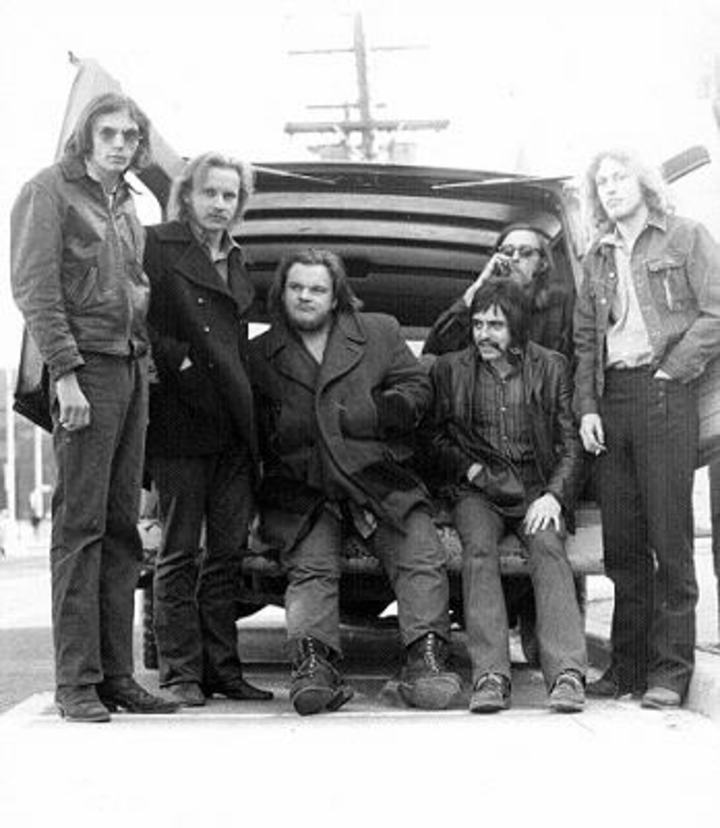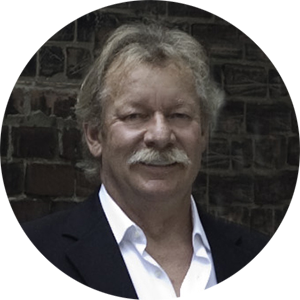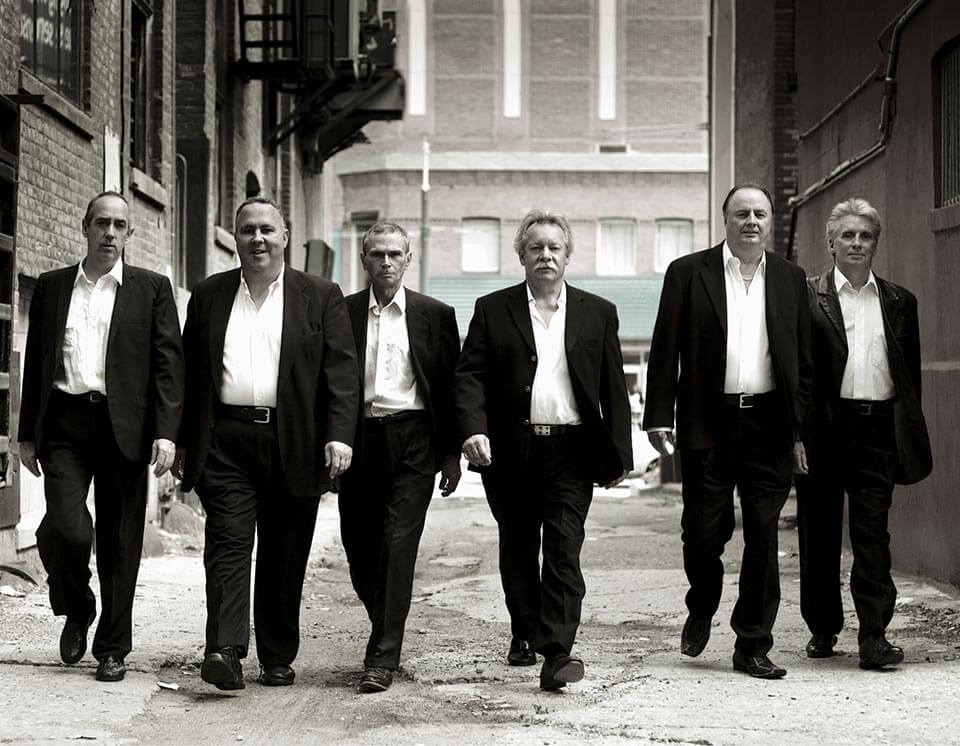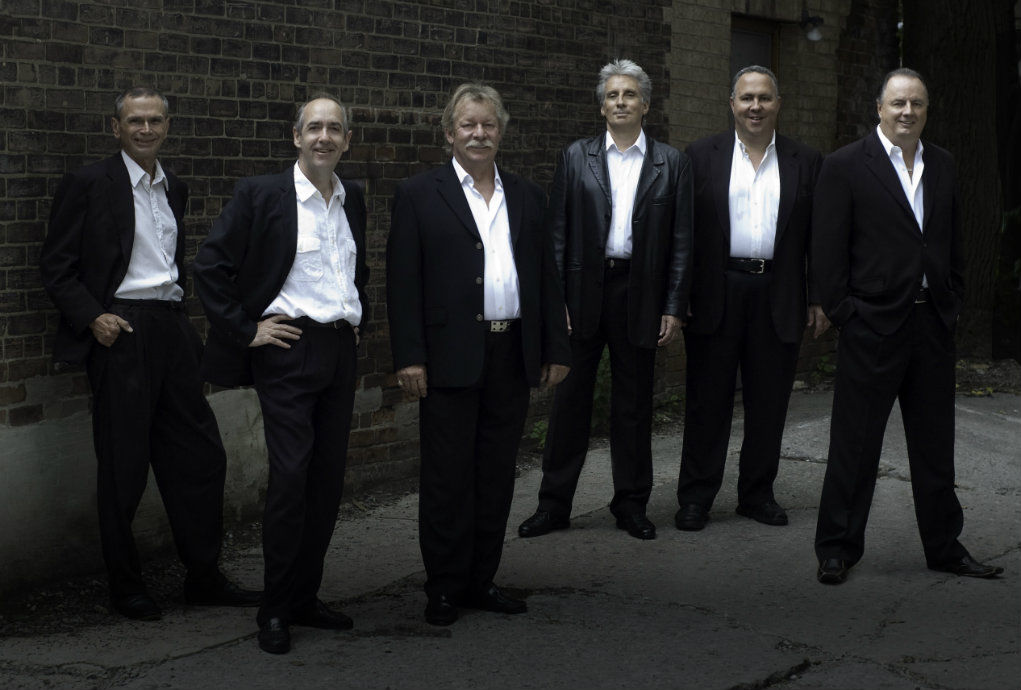There are all sorts of legends in this world – famous or not. Becoming one means finding your particular role, your calling, following it, and touching others around you. That’s exactly what the Downchild Blues Band (shortened to simply Downchild since the 1980s) has been doing since its formation. Brothers Donnie “Mr. Downchild” Walsh and Richard “Hock” Walsh co-founded the group in Toronto in 1969. Along with bandmates Dave Woodward, Cash Wall, John Tanti, and Jim Milne, they spent two years as the house band at Grossman’s Tavern.

Having been dubbed “The Father of Canadian Blues,” Donnie Walsh (guitar/harmonica) still steers the band, as he’s always done. The current lead singer, Chuck Jackson (vocals/harmonica), has only been with the band for 30 years. We recently had the chance to speak with them both about Downchild’s history, their personal influences, and more.

“We just started playing blues because we really liked it,” Walsh shared. “My kid brother could sing really, really good. I’ve always thought to have a blues band, you had to have a blues singer. I saw a lot of bands who called themselves blues bands but they didn’t have the vocalist. I was very fortunate (to have ‘Hock’). Blues, initially, is the vocals. It’s what you’re saying to people. You can have all this other stuff, but that just ends up being instrumentalists. Remember The Ventures? Great band, no singer. To me, a great vocalist is really important.”
When you consider the truly great blues artists, the vocals were, and are, the lion’s share of the package. As illustrious as he was on guitar, Robert Johnson’s voice conveyed powerful emotion. “It was absolutely fabulous,” Walsh agreed. “When it was done, it was just him playing behind his singing.”
In the early days of Downchild Blues Band, Hock Walsh was that guy vocally. He had the pipes to convey the band’s message. Chuck Jackson has been filling those extraordinarily large shoes for the past three decades. “Chuck sings great,” Donnie says. “Hock had hard shoes to fill. Chuck started coming up on John Mayall and stuff like that. Hock started out on Jimmy Reed because I had a record player back then that would play an album over and over. We’d go to bed at night and it would still be playing in the morning.”

“Hock and I are both blues singers, and were great friends,” Jackson states. “I was in a band in Toronto called the Cameo Blues Band which was basically the house band at a bar called The Cameo Lounge in Hotel Isabella. Hock was a singer for that band as well, and he and Donnie and Jane (Vasey) would come and sit in with us. I started to learn some of the Downchild tunes but sometimes couldn’t figure out the lyrics. I’d say ‘Hock, I can’t figure out what you’re saying there,’ and he would say, ‘I don’t know what I singing there.’ He didn’t know either (laughs). But he was a great guy and helped me out a lot.”
A great many Downchild fans were first introduced to their music through a third party. That being The Blues Brothers’ album Briefcase Full of Blues in 1978. Three songs on that album were either written or recorded by Downchild in their early days. “(I Got Everything I Need) Almost” and “Shot Gun Blues” were both written by Donnie Walsh. And their version of the Jesse Stone/Big Joe Turner tune “Flip, Flop, and Fly” was Downchild’s only hit at the time and became Hock Walsh’s signature song.
“There was something really great about that album,” Jackson says. “Because it was live, they would say, ‘here’s a song by Downchild Blues Band.’ They were very much promoting the original performers on that record. That gave people a chance to go and check out the original guys that did that stuff. I mean even though ‘Flip’ was a Big Joe Turner tune, when we released it, it hit the Top 10 on Canadian AM radio in 1972. Trust me when I say there was no blues on AM radio here in 1972. That was before I was in the band, but there were maybe three known blues bands in all of Canada. You had to win people over.”
The Downchild Blues Band served as inspiration for the characters of Joliet Jake and Elwood Blues. Elwood was based on Donnie Walsh, a harmonica player and guitarist, while Jake was based on Richard Walsh, the lead singer. The reason those three songs were chosen for inclusion on the Blues Brothers debut album was because they best exemplified Hock’s vocal style.
Dan Aykroyd had seen, and jammed with, Downchild several times, and took John Belushi to Canada with him to show them off to him. “I still see Akroyd fairly often, Walsh says. “He lives within a 100 miles of me, and we run into each other in Toronto which is where we both started out.” We were curious then about the original inspiration on Downchild’s members.
What artists influenced them? “I had a lot of influences,” says Jackson. “I was raised by my grandparents so I originally came up listening to Hank Snow, Hank Williams, and stuff like that. I was really an old-time country fan. But then I started listening to Junior Wells, Paul Butterfield, and BB was one of my favorite singers. But, I also listened to a lot of R&B like Otis Redding, and Wilson Pickett too. I’m a singer that plays harp. Donnie and I do some great harmonica stuff together and I double up a lot of horn parts on the harp. On the harmonica, my influences were Charlie McCoy, Junior Wells, Walter ‘Shakey’ Horton, and of course Little Walter. The first blues person I ever saw live was Buddy Guy at the Exposition when I was about 15 years old.
“I was in band in the 5th grade and everybody wanted to be the Beatles and stuff like that. Our guitar player went to London on vacation with his parents and came back with these records of John Mayall with Eric Clapton and like that. That was the first stuff I started listening to, and from there it was Muddy, Willie Dixon, Howlin’ Wolf. I mean, even the Stones’ first big hit was ‘Little Red Rooster’. That was the connection.”
“Jimmy Reed,” Walsh responded without hesitation. “There was a double album called Jimmy Reed at Carnegie Hall. It was great because it wasn’t recorded at Carnegie Hall. It was double album, but it wasn’t live, and was just a collection of his 45s. He did actually play Carnegie Hall, but they screwed up the recording. I didn’t find that out until way later. Anyway, that was it. I got that album and wore it out. When I first heard it, that was it for me.
“The name of the band came from a song by Sonny Boy Williamson II, ‘Mr. Downchild.’ At one time I worked at a record store, and in the back of the store, downstairs, was what they called the blues room. It had 45s stocked alphabetically, around the whole room. It was unbelievable. When nobody was there, I’d go through all these records. Of course I knew the guys on Chess and the guys on Vee-Jay, but all of a sudden there was all these other artists. I chose ‘Mr. Downchild’ because I really liked the song, and thinking I was being smart, I thought nobody else is going to have this name.”
Donnie Walsh has come to be known as “Mr. Downchild,” a moniker he says is just due to that record. “Anybody who knows Sonny Boy records might know this,” Walsh shared. “One version of that song is called ‘Mr. Downchild,’ but that’s all a mistake too. You know the lyrics go ‘Mr. Down Child take this fool’s advice’? Well it’s not ‘Mr. Downchild,’ it’s ‘listen downchild take this fool’s advice.’ Listen to it again very closely, you’ll hear it.”
Is it fair to call Walsh the “Father of Canadian Blues?” Maybe. “I was one of the first blues bands in Canada. I got a hit record. So everybody across Canada knew Downchild Blues Band. I don’t remember there being any blues bands prior to us. There was a small blues scene in several individual cities. When we first toured, we found a blues band or two in Winnipeg, and then there was a blues band in Calgary, and a blues band in Edmonton. I got to meet all these guys as we toured around, and got to be friends with them. Most of those bands aren’t around anymore because touring across Canada is tough thing. One tour and many bands would call it quits. Sometimes the first stop may be 900 miles, then drive 400 miles and play the next night.”
“When I was coming up, we had a really big blues scene in Toronto,” shares Jackson. “We had places like the Colonial Tavern, where I saw Muddy, and John Lee Hooker. I worked nights, but every Saturday night I’d be in the front row of the balcony at the Colonial. It’s where I saw all the greats.”
Downchild has had 50 plus members come and go from the band over the years. That number includes some stand-out artists that include Jane Vasey, Kenny Neal, and Wayne Jackson, to name just a few. Through all the highs and lows Downchild has kept strong, touring relentlessly. “I think that at last count there have been 88 members of the band over the years,” Walsh says. “There were certain times, like when we were touring for not much money in the beginning, that at the end of the tour, one or two people would say, ‘that’s it.’ But there were some standout moments as well. Meeting and hanging around with James Cotton was certainly a high point, We played with him in Toronto and Chicago. James was a big inspiration and just a great guy. I have a stack of day planners that have all the notes from almost all the years. I can look up any date and see where we were, what we were doing, and who we played with.”
“One of the high points for me was opening for BB King in 1999,” says Jackson. “We killed it, and after the show BB asked us to come into his dressing room. We were in there for like 45 minutes talking about the blues, talking about the millennium coming up, and just general stuff. BB wasn’t supposed to be drinking because of his diabetes, but he loved Southern Comfort and would have one of the guys mix it with apple juice so nobody could tell. After our time with him, as we were leaving, there was a line of maybe 30-35 people waiting to go in and see him. He would take time to talk to them every single time. He was just a wonderful, wonderful man.”
It’s hard to think that any blues fans are unfamiliar with the legacy of Downchild, but just in case, we wondered what these current band members would share about the group. “A lot of people will say, ‘Canada? What do you know about the blues in Canada?” Jackson says. “We know a lot about the blues since we have such a vibrant blues scene here. I remember seeing James Cotton and Buddy Guy, but I also saw Sam and Dave, Wilson Pickett, Otis Redding and lots of other great R&B artists in the clubs on Young Street. We still have some great blues bands here. Everybody is writing, Canadian acts are going down to the Blues Challenge, it’s great. The only bad thing is that at our age now, we have more doctor’s appointments than gigs (laughs).”
“Can I change your diaper?” laughs Walsh. “It’s just been great to keep that style of music up on the surface where people can hear it all the time. It’s great to carry on the tradition, even though it’s not the real tradition. It’s just the music. I don’t hop freights or ride the rails. I don’t pick cotton. But it’s carrying on the tradition of a musical style which I really like.”

As a group, Downchild has received 4 Maple Blues Awards, 2 Juno Awards and a Great Canadian Blues Award from the CBC. Donnie Walsh has won a Blues With a Feeling Award from the Toronto Blues Society honoring his distinguished career, and has been inducted into the Canadian Blues Museum Hall of Fame. Chuck Jackson has received 2 Maple Blues Awards as Male Vocalist of the Year, and a Blues With a Feeling Award.
On August 14th, Downchild released their 50th Anniversary – Live at the Toronto Jazz Festival album. Recorded last summer on June 22, 2019 it features an all-star line up of special guests including, long-time friend Dan Aykroyd, former Letterman bandleader Paul Shaffer, blues/rock icon David Wilcox, Grammy nominee Kenny Neal, Gene Taylor (Fabulous Thunderbirds), Peter Jeffrey and Finland’s Queen of slide guitar Erja Lyytinen. It is their 34th album release and can be purchased here.
Downchild
*Feature image Stephen Wild



